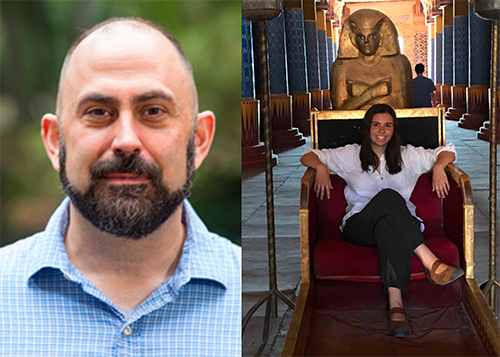News from The Mahurin Honors College
Dr. Rich and Madelynn Einhorn Spotlight
- Sydney Windhorst
- Friday, October 7th, 2022

The Mahurin Honors College (MHC) has always made it a priority to equip students with the resources they need to pursue learning both inside and outside of the classroom. When looking for opportunities outside of the classroom, many scholars look for opportunities to conduct research. WKU faculty members are great at connecting with scholars, but few have worked as closely with MHC scholars pursuing their academic passions than Dr. Timothy Rich.
Dr. Rich, Professor of Political Science at Western Kentucky University, came to WKU following completion of his Ph.D. from Indiana University. When arriving on campus, Dr. Rich heard talk of a Faculty-Undergraduate Student Engagement (FUSE) Grant that sounded similar to something he had done as an undergrad himself. After announcing the grant to his classes, two students applied under his mentorship and received funding for their research projects. Since then, Dr. Rich has aided roughly 30 scholars in receiving thousands of dollars to support undergraduate research through funding from FUSE grants.
One student with whom Dr. Rich worked closely with during their time on the Hill is Madelynn Einhorn (MHC’ 22). Madelynn majored in Political Science and Economics while at WKU and received a certificate in Geographic Information Systems. Many of Madelynn’s research projects related to her majors and can be found on Dr. Rich’s website, where he lists every published student project with which he has aided.
Research is a crucial piece to Madelynn’s story. In addition to serving as a tutor and four-year member of the nationally-renowned WKU Forensics team, Madelynn also received a FUSE grant and completed a Capstone Experience/Thesis (CE/T) on the way to being named the 2022 MHC Scholar of the Year. Madelynn says that the research she conducted enabled her to develop a deeper passion for the subjects she was studying and foster lasting friendships with peers she collaborated with on projects. Dr. Rich often partners students up with upperclassmen or alumni to offer their expertise and encouragement.
But what type of students will be successful in research?
Dr. Rich says research is not in fact limited to any type of student. “Students will often think that they're not ready, that they're not the type of student who can do research, or that research is just meant for people in a lab.” However, research applies to every major, passion, or interest.
While research is open to all students, there are certainly some qualities students should have to benefit them in the process. Dr. Rich boils it down to one word: interest.
“Students do not need to have the research skills, in many cases those skills are obtained through the process. Students simply need to be interested…in anything.” When looking at research, Dr. Rich added “It could be party politics or LGBTQ issues, but there is no one path.” It is the students who question the world around them or ponder on class topics outside of the lecture hall that will be successful at research because their interests motivate them. This will also drive students to discover answers through collaboration with others and seeking resources.
Madelynn would keep a small journal with her at all times and write down any bizarre thought or question that popped into her head throughout the day. This journal sparked the ideas for many of her research projects.
Undergraduate research is vital for any student considering graduate school or looking to set themselves apart. Dr. Rich explains, “it is important to move beyond regurgitation. Students must surpass just consuming and have an individual thought. Reading, taking notes, and passing tests is not enough. To show you are passionate about an issue and to have impact, you need to do research. Even if students never publish or it's all small publications, they gain confidence. They get used to writing with others and writing with clarity. Some will do conferences, so they'll present not just on campus, but in regional campus conferences. That goes a long way when you interview for jobs or graduate school. ”
So now it's up to you. What are your interests? What do you wonder about? What questions do you want to answer? Who will you inspire through your academic pursuits?
Some of the links on this page may require additional software to view.

